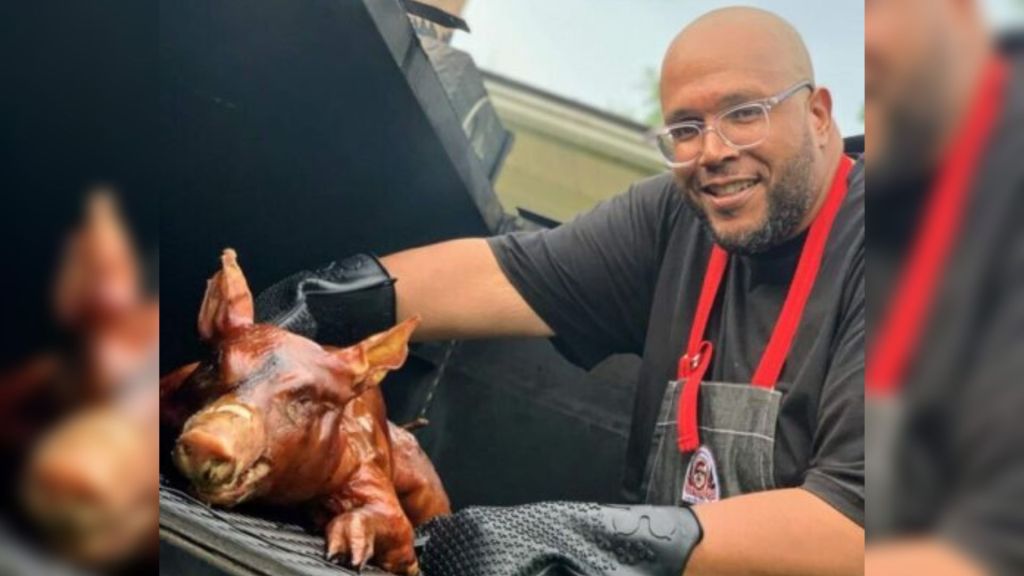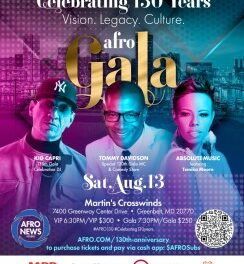By Amber D. Dodd
Special to the AFRO
adodd@afro.com
Amid a major heat wave, 35 teams further turned up the heat June 23 during the 32nd Annual Giant® National Capital Barbecue Battle, a delicious competition featuring categories such as pork, brisket, chicken and original sauce, which was held in downtown Washington, D.C.

For the Good Googly Goo BBQ team, after a long day toiling over hot coals, their competitive fire waned—unlike the sun’s heat. Both a vendor and competitor, Norris “Syd” Sydnor, founder of Good Googly Goo, worked until he couldn’t.
“Last night, I was ready to throw the towel in on the competition,” Sydnor said. “It was 2 a.m., no sleep, just been in the hot sun all day. I dug down deep and got some willpower somewhere.”
The work paid off. Sydnor and the Good Googly Goo crew would be named the barbecue battle’s grand champion, earning their title by placing in a series of subcategories.
“It means so much to get this championship right here in the nation’s capital,” said Sydnor, a Mitchesville, Md. native.
During the Giant BBQ battle, Sydnor and other Black barbecue gurus sat down with the AFRO to talk about the Black history behind the beloved summer staple, and how slavery began the American tradition known as barbecue today.
“It’s my ancestors that give me inspiration,” Sydnor said. “I didn’t see many people of color in these competitions yet, historically, we are the backbone of what started barbecue.”
According to Food Network, the etymology of barbecue is found in indigenous terminology like “barbacoa.” The Taino, the Caribbean Spanish indigenous group inhabiting Hispaniola, would prepare animals for meals by slowly roasting them and cooking them under fire.
Barbecue’s American roots begin in slavery when enslaved cooks would prepare meals for others on the plantation, using meat unwanted or unused by slave masters.
“It was real tough cuts of meats, and they had to learn how to cook it,” Sydnor said.
Though the barbecue battle featured mostly mid-Atlantic competition teams, American barbecue’s Black, Southern roots did not go unnoticed, especially by festival goers such as Jordan Howard, an Athens, Ga. native.
“I’m from the South; we eat a lot of pork, so seeing what different areas have good or bad barbecue, it’s a pretty fun time,” Howard said. “It’s cool to see that the South is this far north with our food influence.”
As a vendor, NC Ribs on Wheels presented North Carolina’s barbecue traditions. Its owner, lifelong cook Angus Thompson, has run the business for 14 years, competing in various barbecue competitions.
“We always have barbecue battles down in Lexington, N.C., because it’s in the middle of the state,” Thompson said. “One of the unique things about North Carolina is ‘whole hog.’ We grew up cooking it on a metal bed frame. We’d dig a hole; we flattened the pig out.”
North Carolina’s barbecue features two different styles: vinegar-based and tomato-based.
“The state is split right down the middle: the east is known for the vinegar-based barbecue, and the west is known for the ketchup-based,” Thompson said.
Thompson, a Fairmont, N.C. native, prefers a vinegar-based barbecue, just like his mentor, his great-uncle Hayward Thompson.
“People ask if we do a mustard-based sauce, I say ‘No, but I can give you some ketchup to put on a hot dog,’” Thompson joked.
A self-proclaimed “old schooler,” he never strays away from North Carolina’s barbecue ways of his great- uncle.
“He taught me to move the coals—don’t get them too hot, don’t get them too cold,” Angus Thompson recalled. “When I was growing up, he had a garden…we used to go and get the white vinegar and let it sit for six, seven, eight days.”
Awaiting the results from the barbecue judges, 82-year-old D.C. native Andrew Majett, owner of Ribs by Andy, sat close to the trophy table. Majett’s love for barbecue began with the freedom his grandmother Sadie Pankey granted him to cook whatever he wanted in her kitchen. Now, many years later, Majett has created his own dry rub for Ribs by Andy and won awards in grilling and smoking. He’s competed in cooking contests for 30 years.
In the District’s edition of barbecue, Majett said it reflects the melting pot of the nation’s capital.
“It’s a mix of different places, flavors and seasonings,” said Majett, who grew up in the Brightwood area. “ open my horizon up. You have people from all different cultures of life, and everybody eats food.”
When discussing barbecue’s roots, Majett pointed to the history of Black American culture being appropriated and generalized as American culture, something he finds happening in barbecue culture often.
“Barbecue actually started during slavery, most people don’t know that and won’t accept it because they don’t want to accept that Black people or people of color discovered anything,” Majett said. “You have people talking about ‘soul’ food, but you’re really talking about food only available to slaves.”
At the end of the award ceremony, Syndor and the Good Googly Goo Crew hoisted their trophy and claimed their prize as this year’s Giant BBQ Battle Grand Champion.
Sydnor gave thanks to his family members, including a friend of his who traveled from Atlanta with his son, and also recognized the historical importance of the Black barbecue community, tracing the ancestral culinary line in one of America’s favorite traditions.
“Cooking this barbecue, it’s in our blood,” Sydnor said. “We don’t do just D.C. justice but our ancestors when they see us with achievements in barbecue knowing its backstory. It feels good.”
The post Giant’s BBQ Battle winner Good Googly Goo reflects on the Black roots of barbecue appeared first on AFRO American Newspapers.










